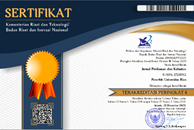- Focus and Scope
- Section Policies
- Peer Review Process
- Publication Frequency
- Open Access Policy
- Archiving
- Plagiarism Policy
- Copyright
- Licensing
Focus and Scope
Jurnal Perikanan dan Kelautan (JPK) was published by the Faculty of Fisheries and Marine of the Universitas Riau in 2007. Jurnal Perikanan dan Kelautan Universitas Riau accepts manuscript in the form of original research, and review in all area of fisheries sciences, included but not limited to:
- Aquaculture
- Fish diseases,
- Fisheries biology,
- Fisheries socioeconomic,
- Fisheries technology,
- Management of aquatic resources,
- Fisheries product technology,
- Utilization and management of fishery
- Oceanography
Section Policies
Articles
Peer Review Process
Only manuscripts with research contents that are in line with the focus and scope of the Journal of Fisheries and Marine will be selected for further review. All selected manuscripts are then verified by the journal’s editors for writing format based on the journal guidelines and checked for potential plagiarism using plagiarism detection software (Ithenticate and Google Scholar).
Only after satisfying the writing format requirements and passing plagiarism checks, the Editor in Chief will assign a manuscript to one of the members of the Editorial Board to determine if the manuscript is accepted for publication. A regular editorial board meeting is held to formally accept or reject manuscripts. The rejected manuscripts will be returned to the authors.
The accepted manuscripts will be sent to reviewers following a blind peer-review policy. The reviewed manuscripts are sent back to the authors for the necessary revision. The revised manuscripts from the authors will be rechecked for plagiarism to maintain high publication quality post-revision process.
The journal’s editors will carry out final proofreading in consultation with the authors to improve the readability of the revised manuscripts for final publication. All review and publication processes within the Journal of Fisheries and Marine are through the journal's online system.
This journal provides immediate open access to its content on the principle that making research freely available to the public supports a greater global exchange of knowledge.
Initial evaluation of manuscripts
The Editor will first evaluate all manuscripts submitted at a maximum of 4 weeks' time. Although rare, it is entirely feasible for an exceptional manuscript to be accepted at this stage. Those rejected at this stage are insufficiently original, have serious scientific flaws, or are outside the aims and scope of the Jurnal Perikanan dan Kelautan. Those that meet the minimum criteria are passed on to expert reviewers for review.
Type of peer review
Submitted manuscripts will generally be reviewed by two to three experts who will be asked to evaluate whether the manuscript is scientifically sound and coherent, whether it duplicates the already published works, and whether or not the manuscript is sufficiently clear for publication. The method is blind peer review.
Review reports
Reviewers are asked to evaluate whether the manuscript:
- Is original by stating the objectives and gap clearly
- Is methodologically research
- Follows appropriate ethical guidelines
- Has results/findings which are clearly presented and support the conclusions
- Correctly references previous relevant work
- Reviewers are not expected to correct or copyedit manuscripts. Language correction is not part of the peer review process.
Decision
Reviewers advise the editor, who is responsible for the final decision to accept or reject the article. The Editors will reach a decision based on these reports and, where necessary, they will consult with members of the Editorial Board. The editor’s decision is final.
The response of the reviewers will be the basis for the Editor to conclude
- Revisions Required
- Accept Submission
- Decline Submission
- Resubmit Elsewhere
An article was rejected for publication due to various considerations, including
- The article does not fit the scope
- The article does not follow the rules of writing scientific papers / do not follow the author's guidelines
- The fundamental methodological errors
- The author refuses to make suggestions for improvements provided by the reviewer without a logical basis.
- There are indications of plagiarism of more than 25%
Publication Frequency
Jurnal Perikanan dan Kelautan published three times, every February, June, and October
Open Access Policy
This journal provides immediate open access to its content on the principle that making research freely available to the public supports a greater global exchange of knowledge.
Archiving
This journal utilizes the GARUDA by Kementerian Riset Teknologi dan Pendidikan Tinggi Republik Indonesia and the LOCKSS to create a Distributed archiving system and permits those libraries to create permanent archives of the journal for purposes of preservation and restoration.
Plagiarism Policy
The peer-review process is at the core of scientific publishing. As part of Jurnal Perikanan dan Kelautan (JPK) commitment to protecting the integrity of the scholarly record, Jurnal Perikanan dan Kelautan (JPK) feels a strong obligation to support the scientific community in all aspects of research and publishing ethics. All submitted manuscripts must be free from plagiarism contents. All authors are suggested to use plagiarism detection software to do the similarity checking before submitting their manuscript to the journal (please use iThenticate or Turnitin to check the similarity).
Editors will also check the similarity of manuscripts in this journal by using Turnitin or iThenticate software. The manuscript will instantly be rejected if there is plagiarism indicated or detected. The final camera-ready also will be checked again for the similarity rate. The overall similarity rate of a manuscript should not exceed 25 percent, and the similarity rate to a single source should not exceed 10 percent.
Copyright
Open Access authors retain the copyrights of their papers, and all open access articles are distributed under the terms of the Creative Commons Attribution-NonCommercial-NoDerivates 4.0 International License (CC BY-NC-ND 4.0). hich permits others distribute and copy the article as long the original work is properly cited.
Licensing
Jurnal Perikanan dan Kelautan (Journal of Fisheries and Marine)- Universitas Riau is disposed of in the terms of the Creative Commons Attribution-NonCommercial-NoDerivates 4.0 International License (CC BY-NC-ND 4.0).


